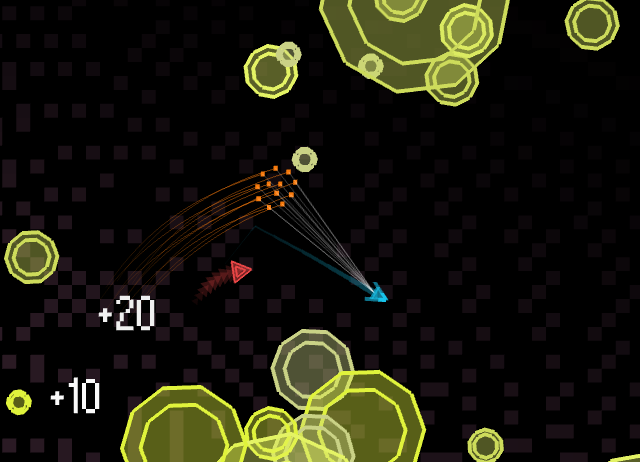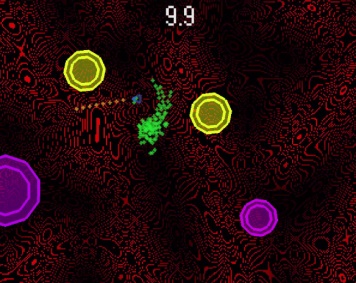
Particle Mace in action.
Nothing can match the power of subtext. In almost any interaction between sentient beings, the things that go unsaid tend to be the most powerful. One reason for why this remains an innate human truth is the power of the personal realization, and its more grandiose cousin, the epiphany.
For whatever reason, piecing together a truth about a situation yourself hits with greater impact than if someone were to walk up and tell you straight out.
In games, creating effective subtext is notoriously difficult. Iterating on mechanics that invite closer critical reads without resorting to skimpy, bolted-on narrative accoutrements like Braid’s text info dumps, or the numerous titles that employ disembodied narrators wholly divorced from gameplay to communicate narrative exposition, is so incredibly rare that when you find it, it merits discussion.
Particle Mace is the rare game that achieves this. Through the strength and purity of its mechanics, Particle Mace subtly explores concepts of selflessness, mindfulness, and a greater understanding of the individual’s place in society.
Seeking Simplicity
In Particle Mace, you control a tiny spaceship awash in a sea of asteroids and strange space enemies. You have no weapons, life bar, or shield to speak of – nothing except for a clumping of physics-enabled particles tethered to your craft. On iOS, players use a single finger to steer the ship; in Windows and Mac, moving the mouse (or the left stick of a gamepad) is the sole method of control.

An early prototype of Particle Mace. The orange projectiles would eventually be removed, and the green shields repurposed into the mace.
In the single-player modes, the main thrust is to see how long you can survive escalating waves of enemies; in multiplayer, you play alongside or against other humans in cooperative or competitive matches.
At first, nothing about this design sounds that extraordinary. In fact, its origins are as a humble school project.
“It started as a homework assignment for a class at Parsons (The New School for Design) with Zach Lieberman,” New York City-based developer Andy Wallace says. “It was called Play This Damn Game and originally had a shooting mechanic, but I gave up on it because the shield was more interesting.”
As playtesters tried out the game, Wallace continued paring down the design to focus on what was clearly the most enjoyable aspect – the particle shields. The hills, the gun, and finally, the shields as they were were removed, leaving behind a fraction of the original design. The shields, once a constant buffer layer around the player, spread out from the ship and assumed their current mace-like form.
As more active elements of the design were removed, the game began to resemble something akin to a Buddhist exercise in patience. Gone was the immediate gratification of the gun, or the margin of error afforded by the shields.
Instead, by using only a single finger, players bobbed and wove through space, mastering how to move just so in order to harness the physics-driven trajectory of their particles to save themselves from oblivion.
Letting Go of Yourself
By shifting the focus from direct player agency to intensified awareness of the player’s surroundings, Particle Mace’s current form requires a degree of mindfulness uncommonly seen in games. It gently nudges players to not only observe themselves, the field and those in opposition, but also their dependents – in essence, the particles are the player’s children.
In this way, Particle Mace becomes the first minimalist space-themed twitch game that simulates parenthood.
“The absolute number-one focus throughout the entire thing is that kind of mechanical relationship (between the players and the particles).”
–Particle Mace developer Andy Wallace
Intentional or not, almost all of the core game systems reinforce this idea. For example, should players last more than 60 seconds in a level, the white boundaries of the legal playing space begin to shift, spin and contract violently, prompting players to add yet another external demand to the list of things to be aware of.
The result is a meditative focus of watching everything and nothing, being everywhere and nowhere, in order to align all of the disparate elements making demands on the player’s attention.
In Particle Mace, the only way to survive long enough to accomplish any worthwhile objectives is to lose yourself in the greater context, ceding what seem to be immediate interests for the good of those whose fates are tied up in yours.
In other words, in Particle Mace, the only way to win is by becoming a better person.